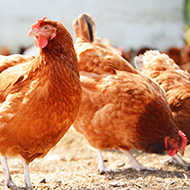
Outcomes could support ongoing global surveillance measures.
Scientists are seeking to develop tissue tests that can identify mild strains of avian influenza that have the potential to become more dangerous.
Led by the University of Edinburgh’s Roslin Institute, the project will focus on both mild and more severe strains associated with recent outbreaks.
The results could identify the risks linked to emerging strains, so those with a high potential for disease can be better managed. Scientists say the outcomes could also support ongoing global surveillance measures for avian flu.
“We know that mild H5 H7 strains can become very dangerous, but it is becoming clear that other mild strains are, to our surprise, becoming more virulent,” explained Professor Lonneke Vervelde of the Roslin Institute. “It is critical that we seek to better understand the risks associated with these potentially harmful viruses.”
In the project, researchers will seek to discover the biological factors that cause some low-risk avian flu strains to become more dangerous. They will do this by manipulating the RNA of some influenza strains in the laboratory to identify the genetic code linked to the risk of harmful disease.
The team will also assess how these viruses interact with wild birds and poultry to understand the potential risks from viruses that pass between the two groups. Experiments will test the impact of the strains on various tissues to check for signs of severe disease than would be expected in domestic or wild birds.
The project is a collaboration with Royal GD Animal Health in the Netherlands, the University of Veterinary Medicine, Hannover, Germany, the National Veterinary Research Institute of Poland, and the National Food Chain Safety Office Veterinary Diagnostic Directorate in Hungary.



 The Animal and Plant Health Agency (APHA) has updated its online reporting service for dead wild birds.
The Animal and Plant Health Agency (APHA) has updated its online reporting service for dead wild birds.